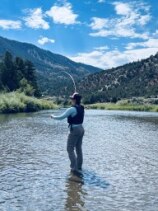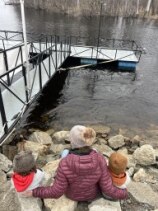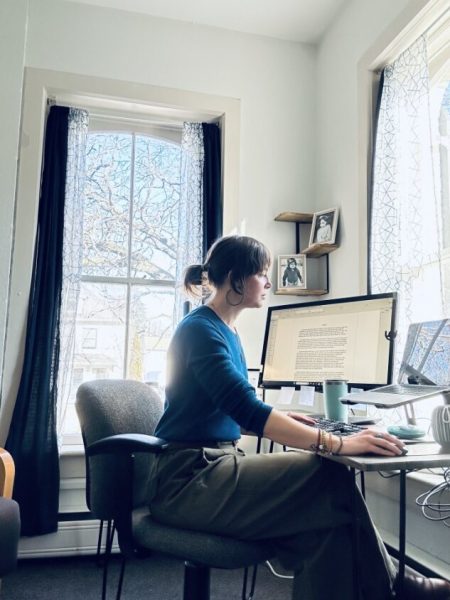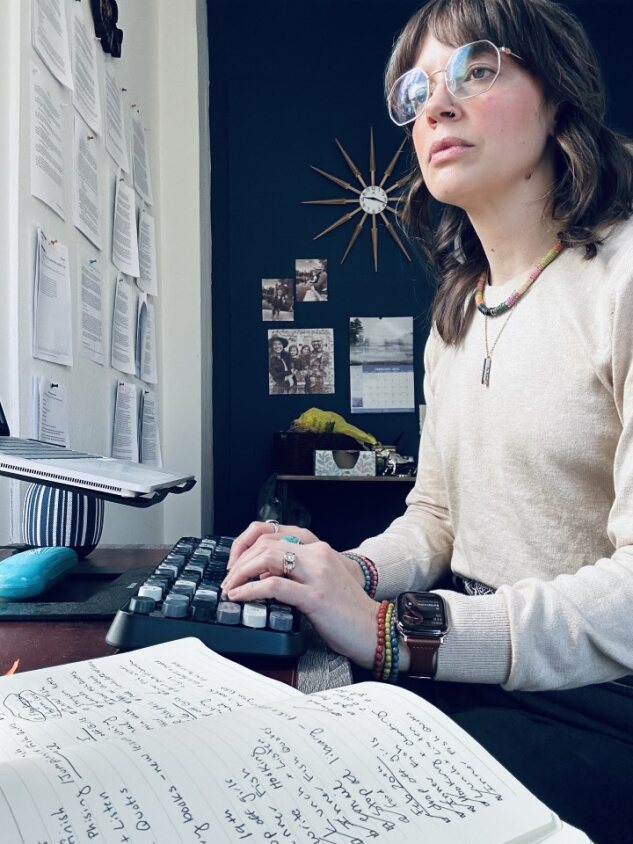With Jodie Mortag, Associate Professor of Writing, returning from her Spring 2025 sabbatical, she discusses an overview of her process, traveling and experiences. What started out as a collection of personal essays, transformed into a memoir of reflection.
Mortag’s main goal was to “keep the Sabbath” during her time away, saying she failed, but by the cause of herself, not by others. She reflected on this goal saying that “it was never realistic to begin with.” Colleague Mark Heimermann, Associate Professor of English, consistently told her “You have done enough! It’s okay to just relax.”
Mortag took multiple fishing trips including bass fishing in the Sheboygan River, sturgeon spearing in Lake Winnebago, salmon fishing in Lake Michigan, working at a trout hatchery in the Upper Peninsula of Michigan and fly fishing in Arkansas. Her family also went white water rafting on the Colorado River, reflecting that it was “beautiful, yet frightening” to see her daughters in the water. She also went muskie fishing in the Bay of Green Bay.

Mortag pointed out that they all were very different trips, but the Upper Peninsula was very nostalgic as she has been going since she was young, revisiting Porcupine Mountains that she hiked the entirety of with her mother and working at the trout hatchery she went to as a child.
At the trout hatchery in Watersmeet, Mich., Mortag seined fish, loaded them into tanks on the truck and transported them hours away to private lakes and ponds. She became friends with the hatchery owner, Dino Giannola, and saw how essential working there is for the business’ survival.
Being a good fisherman has never been the point for Mortag. She may not have changed much as a fisherman, but as a writer, there was a difference. She felt like a writer again, saying “writers are habitual” which is exactly what she was, writing from 9-2:30 Monday through Friday. Even now, upon her return to Lakeland, she has felt like an artist, not just a colleague teacher. 
Mortag reflected on her colleagues and students, how they allowed her to be “able to create again,” and she knew her colleagues Dr. Madeleine Wattenberg, Assistant Professor of Writing, and Dr. Alexis Pegram-Piper, Assistant Professor of Composition, had ahold on things. Mortag also delved into the emotions of writing in the way she was, describing reading her own work out loud as “drinking a cup of coffee.”
It was refreshing to return to Lakeland; she felt she was seen as more than a teacher to her students. There had been a shared empathy that was able to be returned on her journey. She expressed that it was hard for her to leave her students who were graduating in the spring semester, but she found appreciation in those students who were selfless in letting her be “selfish” in taking time away.
Mortag has been teaching since 2007, never having taken a break. This time away was truly needed and was used to read other works on fish and motherhood. She found it easier to relate the two topics, not only biologically but sociologically. She recalls that her book, “Talking Underwater,” has a research focus behind it.
The project took a turn as Mortag found her own narrative and past creeping into each story. Each essay turned into a chapter of her journey, Mortag said, “the past always invades the present,” which may be a consistent mantra her students have heard.
Mortag also said that she had many moments in her writing where she reacted and reflected as a mother, sister and daughter. As she began to understand fish more, she started to understand herself more.
Her father is a big part of her book; his parenting style molded her own. She realized that the choices parents make aren’t always the best, but everyone is just trying to get by. Mortag found herself wanting to be able to “give [herself] and others more grace,” remarking that all of us are just trying to survive.
One of her biggest struggles was how much she missed people in her seclusion. Mortag recalled how she had always enjoyed being alone. She said she feels extroverted to others, but perhaps this has been a façade. However, while on sabbatical she discovered she needed to socialize, making monthly meals with her colleagues.
Mortag reflected that she was so hyper focused on writing she spent less time with her family, particularly because she never had this amount of time as a teacher. Her family continues to be a muse for writing. If not for her family, becoming a wife and mother, this book would not exist. She shared that their muse helped her cope with her past, face her trauma head-on and reach a conclusion.
The article on Mortag pre-sabbatical, “Disappearing like an anglerfish: Jodie Mortag’s sabbatical” written by Jenna Winge compared Mortag to an anglerfish, a fish that lives over 15,000 feet below the surface where there is no light. This was “such a metaphor for sabbatical and motherhood,” said Mortag, “I hid away on sabbatical, and part of me also hid away as a mother.” Mortag confessed that she suffered from post-partum depression with both of her children. This memoir explores the anglerfish of motherhood. “Although your family has grown, you feel even more alone.” Women’s health and mental health are so important; the medical field is not keeping up.
Most days, Mortag no longer feels like an anglerfish, comparing her current self to a spade fish. She stated that spade fish can swim 60% faster in the water when they are schooling, forming a tight knit community. She found she feels safer in a group, like the spade fish, reflecting on how much she needs connection. “To work through trauma, mental health and motherhood you can’t be an anglerfish.”

On her return, Mortag expressed her appreciation for everyone that took her out fishing, the volunteers and strangers who opened their spaces for her. She said she truly felt the impact of community and schooling, considering everyone she met to be friends, rather than strangers.


